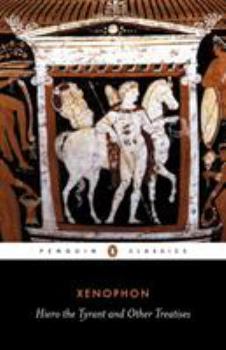Hiero the Tyrant and Other Treatises
One of Socrates' Athenian disciples in his youth, Xenophon (c. 498-354 bc) fought as a mercenary commander in Cyrus the Younger's campaign to seize the Persian throne, and later wrote a wide range of... This description may be from another edition of this product.
Format:Paperback
Language:English
ISBN:0140455256
ISBN13:9780140455250
Release Date:August 2006
Publisher:Penguin Books
Length:248 Pages
Weight:0.50 lbs.
Dimensions:0.7" x 5.1" x 7.7"
Age Range:18 years and up
Grade Range:Postsecondary and higher
Customer Reviews
2 ratings
Review of Waterfield's Xenophon
Published by Thriftbooks.com User , 14 years ago
I really enjoyed this collection of Xenophon's works. It contains many of his smaller treatises (and many extraneous pieces) collected together in one volume. The translations are of course readable, and the introductions to each work are excellent. I absolutely give credit to Paul Carteledge in this matter; he knows his Spartans. My one complaint: endnotes instead of footnotes.
Peace and prosperity
Published by Thriftbooks.com User , 16 years ago
Xenophon is a clever classical writer. For him, there are two sorts of people: `those who work and those who live on the products of others' work.' Or, `a policy of not initiating unjust wars would enable us to punish our enemies far more quickly, because they would not find anyone to come and support their cause.' While `Agesilaos' is a hagiography of a Spartan king, `a superman of self-restraint', an example of a perfect ruler, not a cruel tyrant; and, `How to be a good cavalry commander' contains some good devices: a good commander should be better than his men in executing the tasks he ordered them to do, otherwise he is despised; or, `deceit is your most valuable asset in war'. `Hiero the Tyrant' and `Ways and Means' are superb texts. Hiero complains that a tyrant `spends all his time as if he has been condemned to death by the whole human race for his iniquity.' But, why doesn't he willingly give up his position? The answer is simple: `How could a tyrant ever raise enough money to pay back in full the people he stole from? How could he recompense all the people he put to death?' `I think that the only person who might profit by hanging himself is a tyrant.'!! For Xenophon, what a tyrant should do is manage the State in the interest of the people, not of himself and his cronies, and enhance the power of his community, not of himself. `Ways and Means' is an important text for two reasons. First, the all importance of peace: `The State's funds were enormously increased in times of peace and completely drained in times of war.' Secondly, Xenophon shows us the major importance of silver mines for Athens, not only for the cash it generated, but also for the `huge numbers of men working in the mines; in fact, there was always more work than there were workers.' Xenophon was a proto-Keynesian, pleading for direct State intervention. For him, the State should imitate private entrepreneurs by exploiting itself directly some of its mine concessions. He is also one of the first true economists, explaining the laws of supply and demand, the advantage of pooling capital (risk management) and the multiplier effect. This superbly translated book, with excellent introductions and notes, is a must read for all those interested in the history of mankind.






